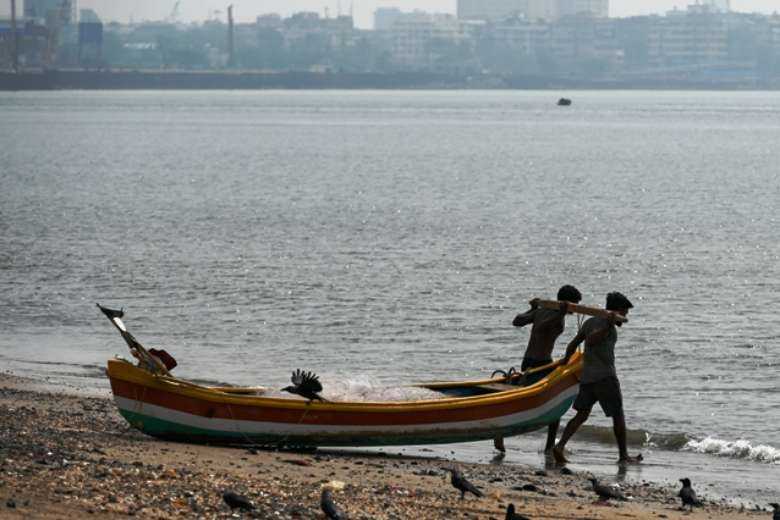Fishermen and their families from Gujarat’s coast have approached a court after being stopped from fishing since 2016

Fishermen pull a boat toward the sea during a hazy day in Mumbai on Nov. 16, 2021. (Photo: AFP)
Muslim fishermen in a coastal village in western Indian Gujarat state have asked the state’s high court for permission to die after being denied their right to livelihoods.
It has been almost a month since 600 people from Gosabara in Porbandar district approached Gujarat High Court for its approval because the practice of euthanasia and committing suicide is illegal under India’s law and forbidden in Islam too.
Allarakha Ismail Thimmar, president of Gosabara Muslim Fishermen’s Society, told UCA News that they had not been allowed to dock their tiny fishing boats in the Porbandar dockyard since 2016.
He said Hindus in the area face no such curbs and added that it was part of the religion-based discrimination Muslim experience in the state ruled by the pro-Hindu Bharatiya Janata Party (BJP).
“When we approach the authorities, they tell us to vacate the village and move out of the district. The 100 or so fishermen and their families have no other choice but to die,” he said.
The petition is likely to come up for hearing late this month but authorities appeared unconcerned.
Gujarat’s Fisheries Minister Jitu Chaudhary couldn’t recall why the Muslim fishermen were agitated. “The matter was brought to my notice but I cannot remember what it was. However, if they come to see me, I will do everything within my powers to help resolve the matter,” he said.
“Why us? Why only Muslim fishermen face such a ban. All permissions and facilities are extended to Hindu fishermen. If this is not discrimination, then what is?”
The fishermen from Gosabara are the only ones among 30 coastal villages along the Arabian Sea in the Porbandar district facing difficulties in pursuing their traditional occupation.
“Why us? Why do only Muslim fishermen face such a ban,” Thimmar asked. “All permissions and facilities are extended to Hindu fishermen. If this is not discrimination, then what is?”
Lalajibhai, the sarpanch or head of neighboring Takada Gosa village, said “it was true the fishermen from Gosabara were indeed being targeted because of their religion.”
Legislative assembly member Babubhai Bokharia said the village’s past record was a cause for worry.
“Everybody knows that RDX landing took place in this village,” he said referring to the infamous case of a consignment of RDX (Research Department Explosive) smuggled inside Gosabara being used in the deadly 1993 serial bomb blasts in India’s commercial capital Mumbai.
The stigma made Gosabara infamous, a pariah place where no school, health clinic or even a mosque exists. It was this tag that was being used to deny it all civic rights and now, the right to livelihood.
Bokharia, a former Gujarat minister, claimed that Muslims from all over Porbandar were moving to Gosabara, which was transforming into a ghetto. “It has become a security concern for the authorities,” he said.
Manish Lodhari, secretary of the National Fishworkers’ Forum (NFF), claimed that the fishermen from Gosabara were “notorious and known for all kinds of illegal and anti-national activities.”
This is the reason that the NFF, a national federation of Indian fisher people, had refused to support the Muslim fishermen, Lodhari added.
But Thimmar finds no logic in such arguments. “We were kids when the incident occurred and nobody from our village was involved in it. How are we now responsible for what happened three decades ago,” Thimmar asked.
He wanted to know if India would ban the entire fishing community from Porbandar because the fishing boat that was used to ferry Pakistani terrorists during the 2008 Mumbai attack belonged to a Hindu fisherman from Porbandar.
The Gosabara fishermen, in their petition to the high court, have claimed that they are loyal citizens of the nation and have never been involved in any kind of anti-national activities
The fishermen are hoping the high court will bring them justice after innumerable protests and representations to politicians and bureaucrats brought no success.
Only once, for a brief period in 2016, their license to fish was restored only to be withdrawn on some flimsy grounds. “Local functionaries of the ruling BJP keep writing to authorities who keep harassing us,” Thimmar complained.
Ironically, this village is just 22 kilometers from Porbandar, the birthplace of Mahatma Gandhi, India’s apostle of peace and communal harmony. But Gujarat, also the home state of Prime Minister Narendra Modi, has been ruled by his pro-Hindu BJP for more than 25 years.
The Gosabara fishermen, in their petition to the high court, have claimed that they are loyal citizens of the nation and have never been involved in any kind of anti-national activities. On the contrary, they have helped Indian security agencies by providing input on Pakistan-sponsored activities in the area, it claimed.
Tushar Kotia, the superintendent of fisheries in Porbandar, said Gosabara was not a notified fish landing spot and hence the fishermen were being told to shift to one of the five landing spots in the same coastal district. “Nobody is stopping them from fishing,” he said.
A well-developed fish landing facility is available barely eight kilometers away at Navi Bandar but Muslim fishermen said their Hindu counterparts were hostile to them. “They are the ones complaining against us, casting all sorts of aspersions against us,” said Thimmar.
Kotia said he was aware of the internal distrust and animosity between the fishermen of Gosabara and Navi Bandar and even hinted at sectarian tension that might lead to serious conflict.
The fishermen from Gosabara fear somebody might plant explosives inside their boats while they are docked at Navi Bandar to frame them. “We don’t want to go there,” they said.
Gujarat has witnessed sectarian violence over the past several decades, and memories of the 2002 riots are still fresh.
Arjun Modhwadia, a former president of the rival Congress party in the state, who hails from Porbandar, said it was unfortunate that traditional fishermen were being denied livelihoods by wrongly painting them as anti-nationals.

